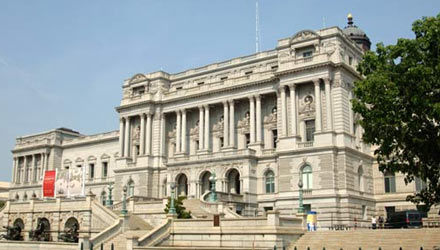
The Library of Congress is the research library that officially serves the United States Congress, but which is the de facto national library of the United States. It is the oldest federal cultural institution in the United States. The Library is housed in three buildings on Capitol Hill in Washington, D.C., and also maintains the Packard Campus in Culpeper, Virginia, which houses the National Audio-Visual Conservation Center.
The library is the second-largest library in the world by collection size, with the largest being the British Library. The Library’s “collections are universal, not limited by subject, format, or national boundary, and include research materials from all parts of the world and in more than 450 languages. Two-thirds of the books it acquires each year are in languages other than English.
The Library of Congress moved to Washington in 1800, after sitting for eleven years in the temporary national capitals of New York and Philadelphia. John J. Beckley, who became the first Librarian of Congress, was paid two dollars per day and was also required to serve as the Clerk of the House of Representatives. The small Congressional Library was housed in the United States Capitol for most of the 19th century until the early 1890s. Most of the original collection had been destroyed by the British in 1814 during the War of 1812. To restore its collection in 1815, the library bought from former president Thomas Jefferson his entire personal collection of 6,487 books.
The Library’s primary mission of researching inquiries made by members of Congress is carried out through the Congressional Research Service, traces its origin to 1914, and was first permanently authorized (as the Legislative Reference Service) with the Legislative Reorganization Act of 1946.
Although the Library is open to the public, only high-ranking government officials may check out books and materials (except through Inter-Library Loan, which is available to the public). The Library promotes literacy and American literature through projects such as the American Folklife Center, American Memory, Center for the Book and Poet Laureate.
